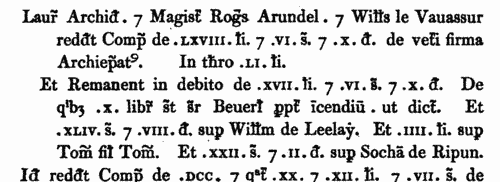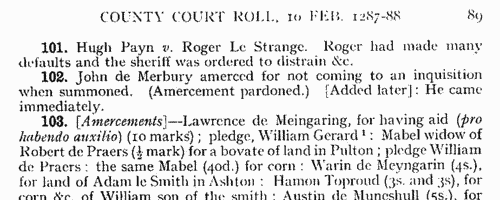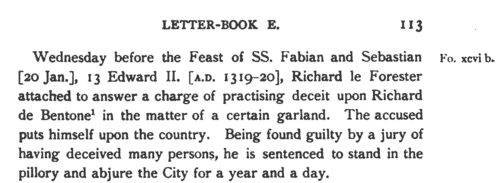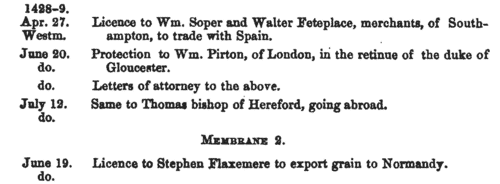Sole Surname Ancestry ResultsOur indexes 1000-1999 include entries for the spelling 'sole'. In the period you have requested, we have the following 201 records (displaying 1 to 10): Single Surname Subscription | | | Buying all 201 results of this search individually would cost £1,144.00. But you can have free access to all 201 records for a year, to view, to save and print, for £100. Save £1,044.00. More... |
These sample scans are from the original record. You will get scans of the full pages or articles where the surname you searched for has been found. Your web browser may prevent the sample windows from opening; in this case please change your browser settings to allow pop-up windows from this site. Pipe Rolls: Kent
(1189-1190)
The Great Rolls of the Pipe contain returns of income and expenditure from the sheriffs and farmers of the various English sheriffdoms, counties or shires and from honors and bishoprics in the hands of the crown. This is the roll for the 1st year of the reign of king Richard I, that is, accounting for the year from Michaelmas 1189 to Michaelmas 1190. Many of the individual surnames that appear are in the accounts of fines &c. levied by justices.SOLE. Cost: £4.00.  | Sample scan, click to enlarge

| Cheshire Court Rolls
(1259-1290)
Civil and criminal cases for most of Cheshire were handled by the county courts. Here we have the county court rolls for November 1259 to August 1260, December 1281 to September 1282, and December 1286 to September 1289. The city of Chester exercised its own jurisdiction, and here we have crown pleas and presentments from 1287 to 1297. The royal manor of Macclesfield in the east of the county had three independent jurisdictions - the hundred, forest and borough. Royal justices in eyre dealt with civil and criminal cases from the hundred and forest during their yearly visits, and here we have records from 1284 to 1290. Also covered by this index is an Inquest of Service in Time of War in Wales of 1288, listing knight's fees in the county. SOLE. Cost: £4.00.  | Sample scan, click to enlarge

| Close Rolls
(1313-1318)
The close rolls of the 7th, 8th, 9th, 10th and 11th years of the reign of king Edward II record the main artery of government administration in England, the orders sent out day by day to individual officers, especially sheriffs of shires: they are an exceptionally rich source for so early a period. In amongst this official material, the rolls were also used as a way of recording many acknowledgments of private debts and contracts between individuals. Most of the contents relate to England, but there are also entries concerning Wales, Scotland, Ireland and the English possessions in France.SOLE. Cost: £4.00.  | Sample scan, click to enlarge

| Freemen and citizens of London
(1314-1337)
Letter Book D, or the Liber Rubeus (Red Book) of the City of London contains enrolments of recognizances between inhabitants, particularly citizens, for sums of money lent or due; grants of pieces of land or property; and various records relating to the city administration, minor infractions, &c. In addition, this volume includes the record of admissions to the freedom of the city by redemption (payment of a sum of money), and the binding and discharge of apprenticeships for the same period. Without freedom of the city - which could only be gained by birth (patrimony), apprenticeship or servitude, or by redemption - no man could open a shop, sell goods retail, or even reside within the city walls (except for a limited time, and then only in the houses of freemen and under frankpledge). The text was edited by Reginald R. Sharpe and printed by order of the Corporation of the City of London in 1902.
SOLE. Cost: £4.00.  | Sample scan, click to enlarge

| Inhabitants of London
(1314-1337)
Letter Book E of the City of London contains enrolments of recognizances between inhabitants, particularly citizens, for sums of money lent or due; grants of pieces of land or property; and various records relating to the city administration, minor infractions, &c.
SOLE. Cost: £4.00.  | Sample scan, click to enlarge

| Inhabitants of London
(1337-1352)
Letter Book F of the City of London contains enrolments of recognizances between inhabitants, particularly citizens, for sums of money lent or due; grants of pieces of land or property; and various records relating to the city administration, minor infractions, &c. The book includes an assessment of the inhabitants in 1346 (pages 143 to 149) listing many householders; a list of mayors and sheriffs from 1189 to 1548 (276-303), and records of the city's use of infangthef (summary execution of certain criminals) down to 1409. The text was edited by Reginald R. Sharpe and printed by order of the Corporation of the City of London in 1904.
SOLE. Cost: £4.00.  | Sample scan, click to enlarge

| London, Essex and Hertfordshire clerks, clerics, monks and clergy
(1361-1374)
Ordinations to first tonsure, acolytes, subdeacons, deacons and priests, from the register of bishop Simon de Sudbury of London. London diocese covered Middlesex, Essex and part of Hertfordshire; the ordinations also attracted many persons from distant dioceses bearing letters dimissory from their ordinaries, and these are duly noted in the text. Many of these clerks would not go on to obtain benefices and remain celibate. The lists of subdeacons, deacons and priests state the clerks' respective titles, i. e., give the names of the person or religious house undertaking to support them. Monks and friars ('religious') are listed separately, and the lists of subdeacons, deacons and priests are also separated into beneficed and not beneficed (or 'not promoted'). The acolyte lists are unusual in giving a parish or diocese of origin.SOLE. Cost: £6.00.  | Sample scan, click to enlarge

| Inhabitants of Yorkshire: Harthill wapentake
(1380)
The poll tax returns for this wapentake, the area around Market Weighton, Pocklington and South Cave.SOLE. Cost: £6.00.  | Sample scan, click to enlarge

| Grantees of offices, commissions and pardons
(1413-1416)
The Patent Rolls are the Chancery enrolments of royal letters patent. Those for the 1st, 2nd and 3rd years of the reign of king Henry V (21 March 1413 to 20 March 1416) were edited for the Public Record Office by R. C. Fowler, and published in 1910. The main contents are royal commissions and grants; ratifications of ecclesiastical estates; writs of aid to royal servants and purveyors; and pardons. The commissions of the peace issued for the English towns and counties and entered on the rolls, being largely repetitive, have been consolidated in a single appendix.SOLE. Cost: £2.00.  | Sample scan, click to enlarge

| The English in France
(1439)
King Henry VI of England (one of the grandsons of Charles VI of France) claimed the throne of France (and quartered the fleurs-de-lis of France with the lions of England on the royal standard) as had his predecessors since Edward III, as descendants of Philip IV of France. The English had real power or influence in Brittany, Normandy, Flanders and Gascony, and actual possession of several coastal garrisons, in particular Calais, where the French inhabitants had been replaced by English. Henry VI came to the throne only seven years after his father had trounced the French at Agincourt; but his cousin, Charles VII, who became king of France in the same year, spent his long reign rebutting the English king's claim to his throne by territorial reconquest and consolidation. The English administration kept a series of records called the French Rolls. On these are recorded royal appointments and commissions in France; letters of protection and safe-conduct to soldiers, merchants, diplomats and pilgrims travelling to France from England and returning, and to foreign legations. There are also licences to merchants to export to the Continent, and to captains to transport pilgrims. As Henry VI's reign progressed, and the English grip on northern France loosened, the French Rolls also increasingly include entries concerning the ransoming of English prisoners.SOLE. Cost: £6.00.  | Sample scan, click to enlarge

|
Research your ancestry, family history, genealogy and one-name study by direct access to original records and archives indexed by surname.
|












